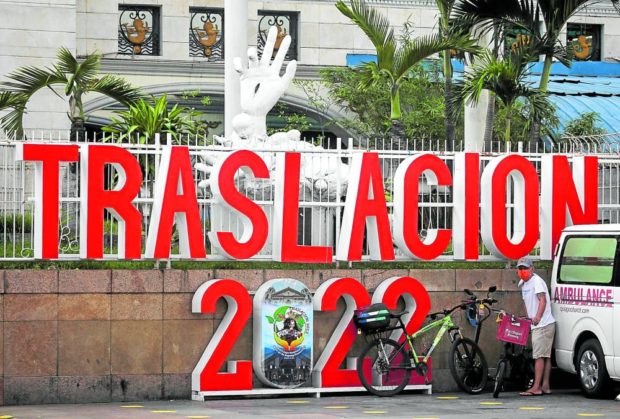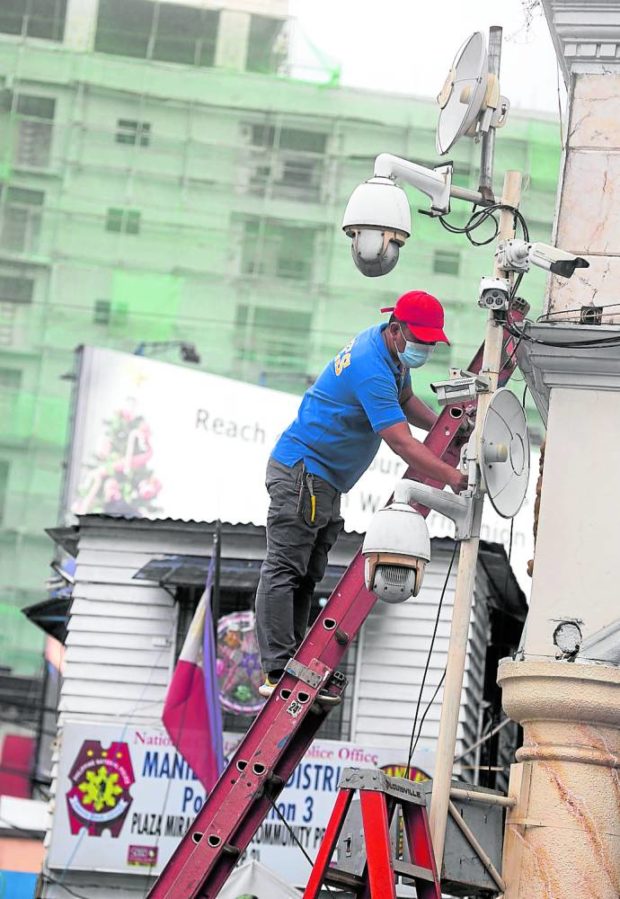Still no ‘Traslacion’: Police to keep devotees off Quiapo

A sign for this year’s “Traslacion” was still mounted at the site despite the procession again being scrapped. —LYN RILLON
MANILA, Philippines — With the traditional procession, or “Traslacion,” honoring the Black Nazarene canceled for the second straight year, Manila Mayor Francisco “Isko Moreno” Domagoso on Wednesday urged devotees not to go to Quiapo Church or even Plaza Miranda.
Quiapo Church will be closed on Jan. 7-9 to prevent devotees of the religious icon from converging on the area, according to Fr. Douglas Badong, parochial vicar of the Minor Basilica of the Black Nazarene.
Domagoso announced “with a heavy heart” at a press conference that only an online Mass would be celebrated. “I hope you understand that this is for your own safety and for your kids and families,” he said.
The decision to cancel the Traslacion was made after a dialogue between officials of the city government and of Quiapo Church led by Badong. It was agreed that no video walls would be installed outside the church and law enforcement units would be deployed to the area.
“I am calling on everyone to not go to the church. The Quiapo Parish has prepared an online Mass, so just stay at home and pray together with your families,” the mayor said.
Article continues after this advertisementAs early as November, the city government announced that the 2022 traslacion would be canceled in view of the COVID-19 pandemic.
Article continues after this advertisementDuterte’s appeal
In his “Talk to the People” on Tuesday night, President Rodrigo Duterte called on the Catholic Church to suspend the Traslacion and physical Masses for the Black Nazarene.
“If the Roman Catholic Church is listening, I am appealing to you to forgo and cancel all physical gatherings, including the procession and the celebration of Mass,” Mr. Duterte said.
“The government does not impose the rules now. … It doesn’t have the character of an imposition, but [is] rather a request from the government for everybody to follow the guidelines set to prevent … again, a superspreader,” he said.
Domagoso has signed an order banning the sale of liquor and alcoholic beverages during the feast of the Black Nazarene.
Under Ordinance No. 5555, the liquor ban will be in effect from 6 p.m. on Jan. 8 to 6 a.m. on Jan. 10.
Hear Mass elsewhere
Devotees of the Black Nazarene may attend the parish’s online Masses or hear Mass in another church while Quiapo Church is closed, Badong told reporters by videoconference on Wednesday.
He said Quiapo Church would reopen on Jan. 10 for physical Masses.
Badong said the parish had submitted detailed plans to hold physical Masses in Quiapo Church during the feast of the Black Nazarene in keeping with public health protocols but that the National Task Force Against COVID-19 had ordered that the church be closed on Jan. 7-9.
“Quiapo Church will be closed but there are more churches around the country that will open to celebrate the feast of the Black Nazarene,” Badong said.

FOR VISUALS The Philippine National Police installs additional security cameras outside Quiapo Church on Wednesday to better monitor crowds and prevent any gathering in the area. —LYN RILLON
Potential superspreaders
“The celebration will go on. It’s just that Quiapo Church will be closed and you can’t come here,” he said, adding that the church would be “ready to accommodate” the faithful on Jan. 10.
“We will still implement the safety protocols, and the devotees follow these,” Badong said. “We know they are excited to see the Nazareno again, so we will discuss the possibility of adding more Masses.”
At his televised meeting on Tuesday with Cabinet members and medical experts, Duterte called for the cancellation of other upcoming religious and secular festivities.
“I apologize in advance and I beg your full understanding,” he said addressing Church leaders. “We have stressed that our job is … to come up with critical decisions to protect public health and public safety.”
Dr. John Wong, an epidemiologist who is a member of the Inter-Agency Task Force for the Management of Emerging Infectious Diseases’ technical working groups on COVID-19 variants and on data analytics, said the government should tell the people to avoid other potential superspreader events such as the Sinulog, Ati-Atihan, and Dinagyang, which are related to the feast of the Sto. Niño this month, and the Chinese New Year celebration on Feb. 1.
He said these events, if attended by crowds not compliant with minimum health protocols, could lead to higher surges.
To counter the current surge in infections that appeared to be triggered by the highly contagious Omicron variant, Wong raised the need to administer the vaccination program efficiently by immunizing the elderly and other unvaccinated persons and giving booster shots to those eligible.
Restrict mobility
Secretary Vince Dizon, presidential adviser on COVID-19 response, called on local government units (LGUs) nationwide to adopt regulations restricting the mobility of unvaccinated persons, similar to what those in the National Capital Region (NCR) had done.
“We are recommending that this policy in NCR also be adopted by the entire country, even in areas where there is no surge yet, because we all know it is really just a matter of time before the Omicron variant spreads…,” he said.
Dizon told the president that Interior Secretary Eduardo Año, Health Secretary Francisco Duque III, Defense Secretary Delfin Lorenzana, and vaccine czar Secretary Carlito Galvez Jr. were backing the recommendation.
The president ordered the implementation of mobility restrictions for the unvaccinated down to the barangay level. He said violators could be charged and jailed.
“If you’re unvaccinated and the barangay captains know it, they can just tell you, ‘Don’t leave [your house]’ but if you do, you will be escorted [back]. If you force the issue, the barangay captain can place you under arrest and bring you to the [police] station,” he said.
Duterte said that if it were up to him, he would not lift a finger to help unvaccinated people who roamed around and got sick.
“Now if you die, you’re on your own,” he said.